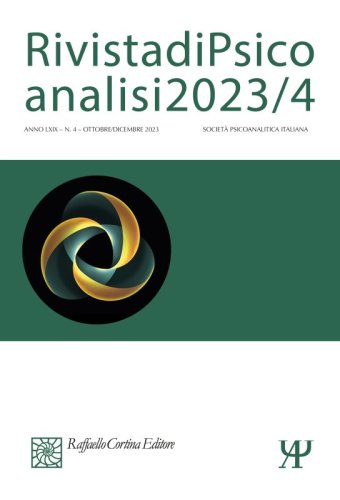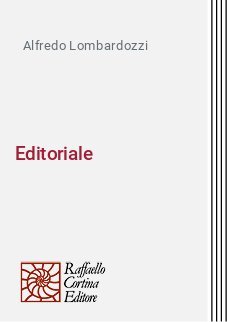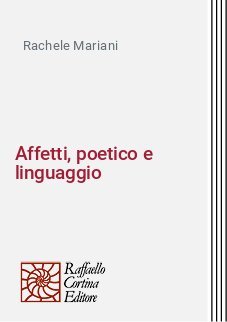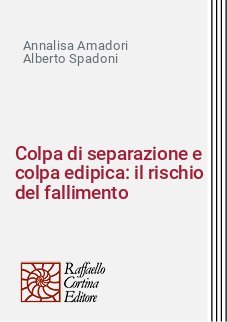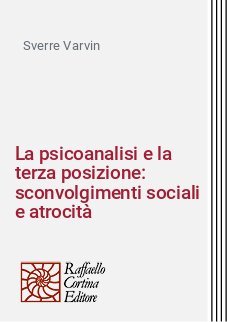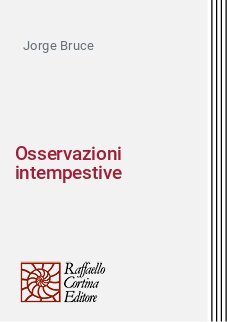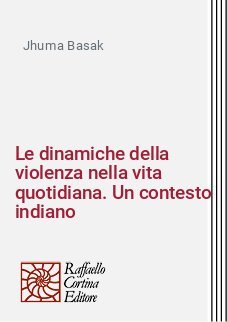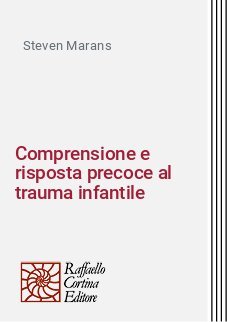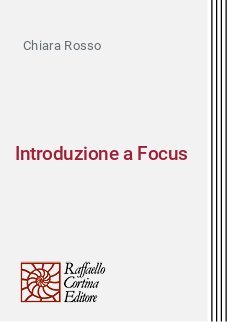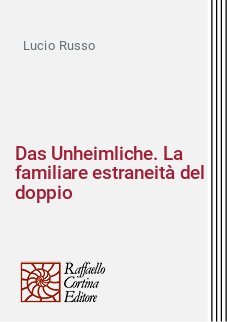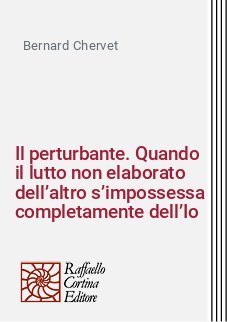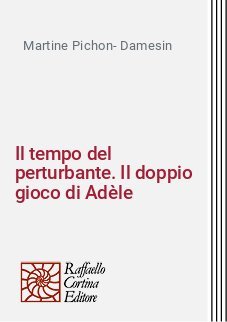Raffaello Cortina Editore
Rivista di Psicoanalisi 2023/4
LXIX - (4) - Ottobre/Dicembre 2023
rivista: La Rivista di Psicoanalisi
pagine: 296
Editoriale
rivista: La Rivista di Psicoanalisi
fascicolo: Rivista di Psicoanalisi 2023/4
di Alfredo Lombardozzi
Affetti, poetico e linguaggio
rivista: La Rivista di Psicoanalisi
fascicolo: Rivista di Psicoanalisi 2023/4
di Rachele Mariani
Affetti, poetico e linguaggio
L’ascolto analitico è una delle forme più complesse di scambio relazionale. Il lavoro si propone di approfondire dal punto di vista teorico come la comprensione tra paziente e analista solleciti uno scambio che va oltre le parole. Attraverso la teoria del codice multiplo verrà interpretata la funzione poetica del linguaggio dei pazienti e come giochi di parole e significati multipli attivino nuove chiavi di ascolto nel flusso associativo dell’analista. Riprendendo la teoria dello stile linguistico di Jakobson, l’accento è posto sulla funzione poetica del linguaggio come quella funzione che cattura aspetti tra le parole, azione, co-azione, ripetizione portino alla trasformazione di significati e a nuovi processi di simbolizzazione. La relazione tra azione, ascolto e processo simbolico attiva un circolo di comunicazione emotiva, che verrà esplicitato attraverso una vignetta clinica.
Parole chiave: Funzione poetica, processo simbolico, processo sub-symbolic, teoria del Codice Multiplo.
Affection, poetics and language. Analytical listening is one of the most complex forms of relational exchange. The work aims to deepen from the theoretical point of view how the understanding between patient and analyst solicits an exchange that goes beyond words. Through the theory of the multiple code, the poetic function of the patients’ language will be interpreted and how word games and multiple meanings activate new listening keys in the analyst’s associative flow. Taking up Jakobson’s theory of linguistic style, the accent is placed on the poetic function of language as that function that captures aspects between words, action, co-action, repetition lead to the transformation of meanings and to new processes of symbolization. The relationship between action, listening and the symbolic process activates a circle of emotional communication, which will be explained through a clinical vignette.
Key words: Multiple Code theory, poetic function, symbolic process, sub-symbolic process.
Affects, poétique et langage. L’écoute analytique est l’une des formes d’échange relationnel les plus complexes. Le travail vise à approfondir d’un point de vue théorique comment la compréhension entre patient et analyste sollicite un échange qui va au-delà des mots. A travers la théorie des codes multiples, la fonction poétique du langage des patients sera interprétée et comment les jeux de mots et les significations multiples activent de nouvelles clés d’écoute dans le flux associatif de l’analyste. Reprenant la théorie du style linguistique de Jakobson, l’accent est mis sur la fonction poétique du langage comme fonction qui capture les aspects entre les mots, l’action, la co-action, la répétition conduisant à la transformation des significations et à de nouveaux processus de symbolisation. La relation entre action, écoute et processus symbolique active un cercle de communication émotionnelle, qui sera expliqué à travers une vignette clinique.
Mots Clés: fonction poétique, processus symbolique, processus sous-symbolique, théorie des codes multiples.
Afectos, poética y lenguaje. La escucha analítica es una de las formas más complejas de intercambio relacional. Este trabajo trata de profundizar, desde un punto de vista teórico,en qué modo el entendimiento entre paciente y analista solicita un intercambio que va más allá de las palabras. A través de la teoría de los códigos múltiples se interpretará la función poética del lenguaje del paciente y cómo los juegos de palabras y los significados múltiples activan nuevas claves de escucha en el flujo asociativo del analista. Retomando la teoría del estilo lingüístico de Jakobson, se hace hincapié en la función poética del lenguaje como aquella función que capta aspectos entre palabras, acción, coacción, repetición que conduce a la transformación de significados y nuevos procesos de simbolización. La relación entre acción, escucha y proceso simbólico activa un círculo de comunicación emocional, el cual será explicado a través de una viñeta clínica.
Palabras Clave: Función poética, proceso simbólico, proceso subsimbólico, teoría del Código Múltiple.
Affekte, Poetisches und Sprache. Das analytische Zuhören ist eine der komplexesten Formen des Beziehungsaustausches. Die Arbeit beabsichtigt, aus theoretischer Perspektive zu untersuchen, wie das Verständnis zwischen Patient und Analytiker einen Austausch hervorruft, der über Worte hinausgeht. Mittels der Multiple-Code-Theorie wird die poetische Funktion der Sprache des Patienten erläutert und untersucht, wie Wortspiele und Mehrfachbedeutungen neue Schlüssel des Zuhörensim Assoziationsflusses des Analytikers aktivieren. Im Aufgreifen von Jakobsons Theorie des sprachlichen Stils wird der Akzent auf die poetische Funktion der Sprache als diejenige Funktion gelegt, die Aspekte zwischen Wörtern, Handlung, Ko-Handlung und Wiederholung erfasst, die zur Transformation der Signifikate und zu neuen Symbolisierungsprozessen führen. Die Beziehung zwischen Handlung, Zuhören und symbolischem Prozess setzt einen Kreislauf emotionaler Kommunikation in Gang, der durch eine klinische Vignette verdeutlicht wird.
Schlüsselwörter: Multiple-Code-Theorie, poetische Funktion, symbolischer Prozess, sub-symbolischer Prozess.
Colpa di separazione e colpa edipica: il rischio del fallimento
rivista: La Rivista di Psicoanalisi
fascicolo: Rivista di Psicoanalisi 2023/4
Autori vari
Colpa di separazione e colpa edipica: il rischio del fallimento
Partendo da una lettura psicoanalitica tradizionale, gli autori focalizzano il concetto di fallimento. Attraverso un caso clinico, mettono in evidenza come alla sua origine siano presenti dinamiche legate a sentimenti di colpa per la separazione. Sono presenti anche elementi della conflittualità edipica a cui la paziente può avere accesso solo in una seconda fase del lavoro analitico.
Parole chiave: Colpa, complesso di Edipo, declassamento, fallimento, processi di individuazione.
Separation guilt and Oedipal guilt: the risk of failing. The authors focus on failure from some psychoanalytical writings. Through a clinical case they put in evidence how at the origin of the separation guilt there are dynamics concerning the process of individualization. There are also elements of Oedipal conflict the patient becomes able to face only in the second phase of analysis.
Key words: Downgrading, failure, guilt, Oedipus complex, process of individuation.
Culpabilité de séparation et culpabilité œdipienne: le risque d’échec. Partant d’une lecture psychanalytique traditionnelle, les auteurs se concentrent sur la notion d’échec. A travers un cas clinique, ils mettent en évidence comment à l’origine il existe des dynamiques liées aux sentiments de culpabilité de la séparation. Il existe également des éléments de conflit œdipien auxquels le patient ne peut avoir accès que dans une seconde phase du travail analytique.
Mots Clés: Culpabilité, complexe d’Œdipe, déclassement, échec, processus d’individuation.
Culpa de separación y culpa edípica: el riesgo defracaso. A partir de una lectura psicoanalítica tradicional, los autores se centran en el concepto de fracaso. A través de un caso clínico, resaltan cómo en su origen existen dinámicas vinculadas a sentimientos de culpa por la separación. También hay elementos del conflicto edípico a los que el paciente sólo puede tener acceso en una segunda fase del trabajo analítico.
Palabras Clave: Culpa, complejo de Edipo, desclasamiento, fracaso, procesos de individuación.
Trennungsschuld und ödipale Schuld: Das Risiko des Scheiterns. Ausgehend von einer traditionellen psychoanalytischen Lektüre fokussieren die Verfasser das Konzept des Scheiterns. Anhand eines klinischen Falls heben sie hervor, wie an dessen Ursprüngen Dynamiken präsent sind, die mit Trennungs-Schuldgefühlen zusammenhängen. Es werden zudem Elemente des ödipalen Konflikts vorgestellt, zu denen der Patient erst in einer zweiten Phase der analytischen Arbeit Zugang hat.
Schlüsselwörter: Abwertung, Individuationsprozesse, Ödipuskomplex, Scheitern, Schuld.
La psicoanalisi e la terza posizione: sconvolgimenti sociali e atrocità
rivista: La Rivista di Psicoanalisi
fascicolo: Rivista di Psicoanalisi 2023/4
di Sverre Varvin
La psicoanalisi e la terza posizione: sconvolgimenti sociali e atrocità
Il lavoro esplora la rottura dell’ordine in varie situazioni, lasciando gli individui vulnerabili a forze non organizzate, come le macchine da guerra e i trafficanti di esseri umani, con conseguente disumanizzazione di massa. Concentrandosi sul campo dei rifugiati, esamina i discorsi alienanti che circondano il trauma e la negligenza della società nei confronti degli individui traumatizzati, sottolineando le gravi conseguenze per le generazioni future. Lo studio analizza come la psicoanalisi possa mediare i processi regressivi a livello individuale, di gruppo e di società. Introduce una concettualizzazione di una terza posizione nel lavoro clinico psicoanalitico, sottolineando la necessità di ancorare la simbolizzazione e il lavoro attraverso un discorso culturale comune. Il modello proposto ripensa la traumatizzazione, includendo le relazioni diadiche, corporee, affettive, di gruppo, familiari e culturali, fornendo un quadro di riferimento per la comprensione e l’elaborazione delle atrocità e della traumatizzazione collettiva a livello individuale e sociale. Vengono presentati esempi clinici a titolo illustrativo.
Parole Chiave: Conflitto sociale, cultura, psicoanalisi, rifugiato, traumatizzazione.
Psychoanalysis and the Third Position: Social Upheavals and Atrocity. The paper explores the breakdown of order in various situations, leaving individuals vulnerable to unorganized forces, such as war-machines and human traffickers, resulting in mass dehumanization. Focusing on the refugee field, it examines the alienating discourses surrounding trauma and society’s neglect of traumatized individuals, emphasizing the severe consequences for future generations. The study delves into how psychoanalysis can mediate regressive processes on individual, group, and societal levels. It introduces a conceptualization of a third position in psychoanalytic clinical work, emphasizing the necessity of anchoring symbolization and working through in a common cultural discourse. The proposed model rethinks traumatization, encompassing dyadic, bodily-affective, group, family, and cultural relations, providing a framework for understanding and working through atrocities and collective traumatization on both individual and social levels. Clinical examples are presented for illustration.
Keywords: Culture, psychoanalysis, refugee, societal conflict, traumatization.
La psychanalyse et la troisième position : bouleversements sociaux et atrocités. L’œuvre explore l’effondrement de l’ordre dans diverses situations, laissant les individus vulnérables aux forces non organisées, telles que les machines de guerre et les trafiquants d’êtres humains, entraînant une déshumanisation massive. En se concentrant sur le camp de réfugiés, il examine les discours aliénants entourant le traumatisme et la négligence de la société envers les individus traumatisés, soulignant les graves conséquences pour les générations futures. L’étude analyse comment la psychanalyse peut arbitrer les processus régressifs au niveau individuel, collectif et social. Il introduit une conceptualisation d’une troisième position dans le travail clinique psychanalytique, soulignant la nécessité d’ancrer la symbolisation et le travail à travers un discours culturel commun. Le modèle proposé repense la traumatisation, y compris les relations dyadiques, corporelles, affectives, de groupe, familiales et culturelles, fournissant un cadre pour comprendre et traiter les atrocités et les traumatismes collectifs aux niveaux individuel et social. Des exemples cliniques sont présentés à titre indicatif
Mots Clés: Conflit social, culture, psychanalyse, réfugié, traumatisation.
El psicoanálisis y la tercera posición: convulsiones sociales y atrocidades. El trabajo explora la ruptura del orden en diversas situaciones, dejando a los individuos vulnerables a fuerzas no organizadas, como máquinas de guerra y traficantes de personas, lo que resulta en una deshumanización masiva. Centrándose en el campo de refugiados, examina los discursos alienantes que rodean el trauma y la negligencia de la sociedad hacia las personas traumatizadas, destacando las graves consecuencias para las generaciones futuras. El estudio analiza cómo el psicoanálisis puede mediar procesos regresivos a nivel individual, grupal y social. Introduce una conceptualización de una tercera posición en el trabajo clínico psicoanalítico, enfatizando la necesidad de anclar la simbolización y el trabajo a través de un discurso cultural común. El modelo propuesto trata de repensar lo traumático, incluyendo las relaciones diádicas, corporales, afectivas, grupales, familiares y culturales, proporcionando un marco para comprender y procesar las atrocidades y lo traumático colectivo a nivel individual y social. Se presentan ejemplos clínicos con fines ilustrativos.
Palabras Clave: Conflicto social, cultura, psicoanálisis, refugiado, traumático.
Die Psychoanalyse und die dritte Position: soziale Umwälzungen und Gräueltaten. Die Arbeit untersucht den Zusammenbruch der Ordnung in verschiedenen Situationen, wodurch Individuen nicht organisierten Kräften, wie Kriegsmaschinen und Menschenhändlern ausgeliefert sind, was zu einer Massenentmenschlichung führt. Im Fokus auf Flüchtlingslager werden die entfremdenden Diskurse untersucht, die das Trauma und die Nachlässigkeit der Gesellschaft in der Auseinandersetzung mit traumatisierten Individuen umgeben, und die schwerwiegenden Folgen für zukünftige Generationen hervorgehoben. Die Studie analysiert, wie die Psychoanalyse die regressiven Prozesse auf individueller, gruppenbezogener und gesellschaftlicher Ebene vermitteln kann. Es wird die Konzeptualisierung einer dritten Position in der psychoanalytischen klinischen Arbeit vorgestellt und die Notwendigkeit betont, die Symbolisierung und die Arbeit für einen gemeinsamen kulturellen Diskurs zu koppeln. Das vorgeschlagene Modell denkt die Traumatisierung neu, indem es dyadische, körperliche, affektive, gruppenbezogene, familiäre und kulturelle Beziehungen miteinschließt und einen Referenzrahmen für das Verstehen und die Verarbeitung von Gräueltaten und kollektiver Traumatisierung auf individueller und sozialer Ebene liefert. Zur Veranschaulichung werden klinische Beispiele angeführt.
Schlüsselwörter: Geflüchtete, Kultur, Psychoanalyse, Sozialer Konflikt, Traumatisierung.
Osservazioni intempestive
rivista: La Rivista di Psicoanalisi
fascicolo: Rivista di Psicoanalisi 2023/4
di Jorge Bruce
Osservazioni intempestive
L’autore sottolinea la pratica pluridecennale di applicare in America Latina metodi psicoanalitici importati senza considerare le caratteristiche uniche della regione. L’America Latina, con il suo ritardo storico, è considerata uno spazio «privilegiato» per affrontare le popolazioni che subiscono discriminazioni, anche se spesso non sono i principali frequentatori della clinica. La proposta è di sviluppare una «psicoanalisi creola», fondendo le intuizioni dei maestri psicoanalitici e adattando gli strumenti più urgenti. Esempi clinici illustrano questo approccio, tra cui una sessione di supervisione che affronta il razzismo in un ospedale e un’analisi che rivela un terreno comune fondamentale che trascende le differenze apparenti. L’autore sostiene la necessità di abbracciare lo spirito avventuroso e creativo della psicoanalisi freudiana, adattandola al diverso panorama sociale e culturale dell’America Latina.
Parole Chiave: Allucinazione negativa, confini, creatività, decolonizzazione, storie.
Untimely observations. The author underscores the decades-long practice of applying imported psychoanalytic methods in Latin America without considering the region’s unique characteristics. Latin America, with its historical lag, is deemed a «privileged» space to confront populations facing discrimination, although they are often not the primary clinic attendees. The proposal is to develop a «creole psychoanalysis», blending insights from psychoanalytic masters while adapting urgently needed tools. Clinical examples illustrate this approach, including a supervision session addressing racism in a hospital and an analysis revealing a fundamental common ground that transcends apparent differences. The author advocates for embracing the adventurous and creative spirit of Freudian psychoanalysis, adapting it to the diverse social and cultural landscape of Latin America.
Keywords: Borders, creativity, decolonisation, negative hallucination, stories.
Des observations intempestives. L’auteur met en évidence la pratique, qui dure depuis des décennies, d’appliquer des méthodes psychanalytiques importées en Amérique latine sans tenir compte des caractéristiques uniques de la région. L’Amérique latine, avec son retard historique, est considérée comme un espace « privilégé » pour faire face aux populations victimes de discrimination, même si elles ne sont souvent pas les principaux visiteurs des cliniques. La proposition est de développer une « psychanalyse créole », fusionnant les intuitions des maîtres psychanalytiques et adaptant les outils les plus urgents. Des exemples cliniques illustrent cette approche, notamment une séance de supervision portant sur le racisme dans un hôpital et une analyse qui révèle un terrain d’entente critique qui transcende les différences apparentes. L’auteur défend la nécessité d’embrasser l’esprit aventureux et créatif de la psychanalyse freudienne, en l’adaptant aux différents paysages sociaux et culturels de l’Amérique latine.
Mots Clés: Créativité, décolonisation, frontières, hallucination négative, histoires.
Observaciones extemporáneas. El autor destaca la práctica, durante décadas, de aplicar métodos psicoanalíticos importados en América Latina sin considerar las características únicas de la región. América Latina, con su retraso histórico, se consideraun espacio «privilegiado» paraafrontarlas poblaciones que sufren de discriminación, aunque muchas veces no sean éstas las presencias clínicas principales. La propuesta es desarrollar un «psicoanálisis criollo», fusionando las intuiciones de los maestros psicoanalíticos y adaptando las herramientas más urgentes. Los ejemplos clínicos ilustran este enfoque, incluída una sesión de supervisión que aborda el racismo en un hospital y un análisis que revela una basefundamental comúnque trascienden las diferencias aparentes. El autor defiende la necesidad de abrazar el espíritu aventurero y creativo del psicoanálisis freudiano, adaptándolo al diferente panorama social y cultural de América Latina.
Palabras Clave: Alucinación negativa, creatividad, descolonización, fronteras, relatos.
Unzeitgemäße Beobachtungen. Der Verfasser hebt die jahrzehntelange Praxis der Anwendung importierter psychoanalytischer Methoden in Lateinamerika hervor, ohne die besonderen Eigenschaften der Region zu berücksichtigen. Lateinamerika mit seinem historischen Rückstand wird als ein bevorzugter Ort für die Auseinandersetzung mit Bevölkerungsgruppen aufgefasst, die Diskrimination ausgesetzt sind, auch wenn sie oft nicht den Hauptteil der Klinik ausmachen. Es wird vorgeschlagen, eine «kreolische Psychoanalyse» zu entwickeln, die die Erkenntnisse der psychoanalytischen Meister vereint und die dringendsten Instrumente adaptiert. Klinische Beispiele illustrieren diese Herangehensweise, darunter eine Supervisionssitzung, die sich mit dem Rassismus in einem Krankenhaus auseinandersetzt, sowie eine Analyse, die eine grundlegende Gemeinsamkeit offenbart, welche die scheinbaren Unterschiede transzendiert. Der Verfasser betont die Notwendigkeit, den abenteuerlichen und kreativen Geist der Freud’schen Psychoanalyse anzunehmen und ihn an das diverse soziale und kulturelle Panorama Lateinamerikas anzupassen.
Schlüsselwörter: Dekolonisierung, Geschichten, Grenzen, Kreativität, negative Halluzination
Le dinamiche della violenza nella vita quotidiana. Un contesto indiano
rivista: La Rivista di Psicoanalisi
fascicolo: Rivista di Psicoanalisi 2023/4
di Jhuma Basak
Le dinamiche della violenza nella vita quotidiana. Un contesto indiano
Questo articolo si addentra nell’intricato arazzo di significati e simboli della cultura indiana, rivelando come i costrutti metafisici della filosofia orientale possano oscurare la sistematica sottomissione della soggettività femminile nell’India contemporanea. L’autrice esplora l’influenza della cultura comunitaria nell’affrontare la perdita, mettendo in luce il senso di colpa transgenerazionale. La difficoltà di elaborare il lutto e lo sfruttamento della morte da parte dell’industria sanitaria evidenziano la fragilità dei legami sociali. Esaminando il concetto di biopotere di Foucault, l’articolo discute come la violenza si rivolga ai soggetti sessuati, manifestandosi come violenza quotidiana e sistemica in India. La costruzione di un ordine patriarcale attraverso i tabù mestruali e la figura della dea-madre si traduce in una brutale violenza contro le donne. Le vignette cliniche inducono a riflettere sulle dimensioni interconnesse della cultura indiana, sollecitando un esame delle strutture politiche che perpetuano l’oppressione sistematica.
Parole Chiave: Comunità, donne, immaginario culturale, soggetti sessuati, violenza.
The Dynamics of a Passionate-Violence in Everyday Living. An Indian Context. This paper delves into the intricate tapestry of meanings and symbols within Indian culture, revealing how metaphysical constructs from Eastern philosophy may obscure the systematic subjugation of female subjectivity in contemporary India. The author explores the influence of community culture on coping with loss, exposing transgenerational guilt. The difficulty in mourning and the exploitation of death by the health industry highlight the fragility of social ties. Examining Foucault’s biopower concept, the paper discusses how violence targets sexed subjects, manifesting as everyday, systemic violence in India. The construction of a patriarchal order through menstrual taboos and the mother-goddess figure results in brutal violence against women. Clinical vignettes prompt reflection on the interconnected dimensions of Indian culture, urging scrutiny of political structures perpetuating systematic oppression.
Keywords: Community, cultural imagination, sexed-subjects, violence, women.
Les dynamiques de la violence dans la vie quotidienne. Un contexte indien. Cet article explore la mosaïque complexe de significations et de symboles de la culture indienne, révélant comment les constructions métaphysiques de la philosophie orientale peuvent obscurcir l’assujettissement systématique de la subjectivité féminine dans l’Inde contemporaine. L’auteur explore l’influence de la culture communautaire dans la gestion de la perte, en mettant en évidence la culpabilité transgénérationnelle. La difficulté du deuil et l’exploitation de la mort par l’industrie de la santé mettent en évidence la fragilité des liens sociaux. En examinant le concept foucaultien de biopouvoir, l’article examine la manière dont la violence cible les sujets sexuels, se manifestant par une violence quotidienne et systémique en Inde. La construction d’un ordre patriarcal à travers les tabous menstruels et la figure de la déesse-mère se traduit par une violence brutale contre les femmes. Les vignettes cliniques incitent à réfléchir sur les dimensions interconnectées de la culture indienne, incitant à un examen des structures politiques qui perpétuent l’oppression systématique.
Mots Clés: Communauté, femmes, imaginaire culturel, sujets sexuels, violence.
La dinámica de la violencia en la vida cotidiana. Un contexto hindú. Este artículo profundiza el intrincado entramado de significados y símbolos de la cultura hindú, revelando cómo las construcciones metafísicas de la filosofía oriental pueden oscurecer el sometimiento sistemático de la subjetividad femenina en India contemporánea. La autora explora la influencia de la cultura comunitaria en el afrontar la pérdida, destacando la culpa transgeneracional. La dificultad de afrontare el duelo y la explotación de la muerte por parte de la industria de la salud resaltan la fragilidad de los vínculos sociales. Al examinar el concepto de biopoder de Foucault, el artículo analiza cómo la violencia se dirige a sujetos sexuales, manifestándose como violencia cotidiana y sistémica en India. La construcción de un orden patriarcal a través de los tabúes menstruales y la figura de la diosa-madre se traduce en una violencia brutal contra la mujer. Las viñetas clínicas incitan a una reflexión sobre las dimensiones interconectadas de la cultura hindú, lo que lleva a un examen de las estructuras políticas que perpetúan la opresión sistemática.
Palabras Clave: Comunidad, imaginario cultural, mujer, sujetos sexuales, violencia.
Die Dynamiken der Gewalt im täglichen Leben. Ein indischer Kontext. Dieser Artikel beschäftigt sich mit dem intrikaten Geflecht von Bedeutungen und Symbolen der indischen Kultur und zeigt auf, wie die metaphysischen Konstrukte der östlichen Philosophie die systematische Unterwerfung der weiblichen Subjektivität im zeitgenössischen Indien verschleiern können. Die Verfasserin untersucht den Einfluss der gemeinschaftlichen Kultur bei der Auseinandersetzung mit Verlusten und hebt das transgenerationale Schuldgefühl hervor. Die Schwierigkeit, Trauer zu verarbeiten, und das Ausbeuten des Todes durch die Gesundheitsindustrie verdeutlichen die Fragilität der sozialen Bindungen. In der Untersuchung von Foucaults Konzept der Bio-Macht erörtert der Artikel, wie sich die Gewalt gegen sexuierte Subjekte richtet und sich in Indien als alltägliche und systemische Gewalt manifestiert. Die Konstruktion einer patriarchalischen Ordnung durch Menstruationstabus und die Figur der Mutter-Göttin übersetzt sich in eine brutale Gewalt gegen Frauen. Klinische Vignetten führen zu einer Reflexion der miteinander verknüpften Dimensionen der indischen Kultur und einer Untersuchung der politischen Strukturen, die die systematische Unterdrückung aufrechterhalten.
Schlüsselwörter: Gemeinschaft, Gewalt, Frauen, kulturelles Imaginäres, sexuierte Subjekte.
Comprensione e risposta precoce al trauma infantile
rivista: La Rivista di Psicoanalisi
fascicolo: Rivista di Psicoanalisi 2023/4
di Steven Marans
Comprensione e risposta precoce al trauma infantile
Questo articolo descrive gli sforzi psicoanalitici per approfondire e applicare la nostra comprensione dei fenomeni traumatici allo sviluppo di strategie di intervento e approcci terapeutici di successo in grado di alleviare la sofferenza immediata e il carico emotivo a lungo termine sperimentato dai bambini che sono stati vittime o testimoni di violenza e altri eventi traumatici.
Parole Chiave: Intervento precoce, esposizione alla violenza, trauma infantile.
Understanding and Responding Early to Childhood Trauma. This paper describes psychoanalytically informed efforts to deepen and apply our understanding of traumatic phenomena to the development of successful intervention strategies and treatment approaches capable of alleviating the immediate suffering and long-term emotional burden experienced by children who have been victims or witnesses of violence and other traumatic events.
Keywords: Childhood trauma, early intervention, violence exposure.
Comprendre les traumatismes de l’enfance et y répondre rapidement aux traumatismes de l'enfance. This paper describes some attempts, based on psychoanalysis, to deepen our understanding of traumatic phenomena and apply it to the development of successful intervention strategies and treatment approaches capable of alleviating the immediate suffering and long-term emotional burden experienced by children who have been victims or witnesses of violence and other traumatic events.
Mots clés: Exposition à la violence, intervention précoce, traumatismes de l'enfance.
Comprensión y respuesta temprana a los traumas infantiles. Este artículo describe algunos intentos, basados en el psicoanálisis, de profundizar nuestra comprensión de los fenómenos traumáticos y aplicarlos al desarrollo de estrategias de intervención y enfoques terapéuticos exitosos que puedan aliviar el sufrimiento inmediato y la carga emocional a largo plazo que experimentan los niños que han sido víctimas o testigos de violencia y otros eventos traumáticos.
Palabras Clave: Exposición a la violencia, intervención temprana, trauma infantil.
Verstehen von und frühzeitige Reaktion auf Kindheitstraumata. Dieser Artikel beschreibt einige auf der Psychoanalyse basierenden Versuche, unser Verständnis traumatischer Phänomene zu vertiefen und dieses Verständnis auf die Entwicklung von erfolgreichen Interventionsstrategien und therapeutischen Ansätzen anzuwenden, die das unmittelbare Leiden und die emotionale Last von Kindern, die Opfer oder Zeugen von Gewalt und anderen traumatischen Erfahrungen geworden sind, langfristig erleichtern können.
Schlüsselwörter: Frühzeitige Intervention, Gewalterfahrung, Kindheitstrauma.
Introduzione a Focus
rivista: La Rivista di Psicoanalisi
fascicolo: Rivista di Psicoanalisi 2023/4
di Chiara Rosso
Das Unheimliche. La familiare estraneità del doppio
rivista: La Rivista di Psicoanalisi
fascicolo: Rivista di Psicoanalisi 2023/4
di Lucio Russo
Das Unheimliche. La familiare estraneità del doppio
L’autore mette in evidenza che nel processo di formazione e di differenziazione, l’Io si confronta inevitabilmente con lo stato originario di inermità e contemporaneamente con la spinta innata a crescere e differenziarsi. Nel processo di formazione e di differenziazione, l’Io incontra nello stesso tempo l’estraneo-familiare, l’angoscia del perturbante, di cui parla Freud. L’altro è inizialmente sia l ‘estraneo, sia il familiare, «l’estraneo-familiare». L’autore propone due versioni del doppio del perturbante. Il doppio strutturante, che è una topologia dell’Io e che include nello spazio privato del Sé l’intimo-familiare e l’estraneo. Inclusione che favorisce la strutturazione dell’Io. Il doppio destrutturante si delinea quando l’alter ego diventa l’estraneo assoluto, l’odiato Io. Nel doppio destrutturante domina l’odio e la violenza, che impediscono all’Io di strutturarsi.
Parole Chiave: Estraneo-familiare, doppio strutturante, doppio destrutturante, perturbante, processo di differenziazione, stato indifferenziato.
Das Unheimliche. The familiar strangeness of the double. The author emphasises that in the process of formation and differentiation, the ego is inevitably confronted with the original state of helplessness and at the same time with the innate urge to grow and differentiate. In the process of formation and differentiation, the ego simultaneously encounters the alien-familiar, the anxiety of the uncanny, of which Freud speaks. The other is initially both the stranger and the familiar, «the stranger-familiar». The author proposes two versions of the double of the perturbing. The structuring double, which is a topology of the Ego and which includes in the private space of the Self the intimate-familiar and the stranger. Inclusion that favours the structuring of the Ego. The deconstructing double is delineated when the alter ego becomes the absolute stranger, the hated Ego. In the deconstructive double, hatred and violence dominate, preventing the ego from structuring itself.
Keywords: Deconstructing double, differentiation process, disturbing, extraneous-familiar, structuring double, undifferentiated state.
Das Unheimliche. L’étrangeté familière du double.L’auteur souligne que dans le processus de formation et de différenciation, le Moi est inévitablement confronté à l’état originel d’impuissance et en même temps à la volonté innée de grandir et de se différencier. Dans le processus de formation et de différenciation, le Moi rencontre en même temps l’étranger-familier, l’angoisse de l’étrangeté dont parle Freud. L’autre est d’abord à la fois l’étranger et le familier, « l’étranger-familier ». L’auteur propose deux versions du double de l’étrangeté. Le double structurant, qui est une topologie du Moi et qui inclut l’intime-familier et l’étranger dans l’espace privé du Soi. Une inclusion qui favorise la structuration du Moi. Le double déstructurant apparaît lorsque l’alter ego devient l’étranger absolu, le moi détesté. Dans le double déstructurant dominent la haine et la violence qui empêchent le moi de se structurer.
Mots Clés: Inconnu-familier, double structurant, double déstructurant, étrangeté, processus de différenciation, état indifférencié.
Das Unheimliche. La familiar extrañeza del doble. El autor destaca que en el proceso de formación y diferenciación, el Yo se enfrenta inevitablemente al estado original de impotencia y al mismo tiempo al impulso innato de crecer y diferenciarse. En el proceso de formación y diferenciación, el Yo encuentra al mismo tiempo lo extraño-familiar, la angustia de lo siniestro, de lo que habla Freud. El otro es inicialmente a la vez lo extraño y lo familiar, «el extraño-familiar». El autor propone dos versiones del doble de lo siniestro. El doble estructurante, que es una topología del Yo y que incluye lo íntimo-familiar y lo extraño en el espacio privado del Self. Inclusión que favorece la estructuración del Yo. El doble desestructurante surge cuando el alter ego se convierte en el absoluto extraño, el ego odiado. En el doble desestructurante dominan el odio y la violencia, que impiden al Yo de poder estructurarse.
Palabras Clave: Doble desestructurante, doble estructurante, estado indiferenciado, extraño-familiar, proceso de diferenciación, siniestro.
Das Unheimliche. Die vertraute Fremdheit des Doppels. Der Verfasser hebt hervor, dass sich das Ich im Ausbildungs- und Differenzierungsprozess unausweichlich mit dem Urzustand der Schwäche und zugleich mit dem natürlichen Drang, zu wachsen und sich zu differenzieren, konfrontiert sieht. Im Ausbildungs- und Differenzierungsprozess begegnet das Ich gleichzeitig dem Fremden-Vertrauten, der Angst vor dem Unheimlichen, von der Freud spricht. Das Andere ist zunächst sowohl das Fremde, als auch das Vertraute, das «Fremde-Vertraute». Der Verfasser schlägt zwei Versionen des Doppels des Unheimlichen vor. Das strukturierende Doppel, das eine Topologie des Ichs ist und im privaten Raum des Selbst das intim-Vertraute und das Fremde umfasst, was die Strukturierung des Ichs unterstützt. Das destrukturierende Doppel zeichnet sich ab, wenn das Alter Ego zum absolut Fremden, zum verhassten Ich wird. Im destrukturierenden Doppel dominieren der Hass und die Gewalt, die das Ich daran hindern, sich zu strukturieren.
Schlüsselwörter: Destrukturierendes Doppel, Differenzierungsprozess, fremd-vertraut, strukturierendes Doppel, undifferenzierter Zustand, Unheimliches.
Il perturbante. Quando il lutto non elaborato dell’altro s’impossessa completamente dell’Io
rivista: La Rivista di Psicoanalisi
fascicolo: Rivista di Psicoanalisi 2023/4
di Bernard Chervet
Il perturbante. Quando il lutto non elaborato dell’altro s’impossessa completamente dell’Io
Utilizzando come punto di partenza della sua riflessione due figure maggiori della tradizione napoletana – «Pulcinella» e «Curcinello», il piccolo corno, – l’autore discute l’ipotesi avanzata da Lucio Russo di una doppia funzione del doppio: strutturante e destrutturante. Egli mette in relazione questa ipotesi, di una doppia funzione del doppio, con la nozione del Perturbante. Secondo l’autore, il Perturbante è una forma di angoscia la cui specificità è collegata alle cosiddette «inclusioni negative» esistenti nelle identificazioni narcisistiche fondanti. Queste «identificazioni riduttive», che conducono il soggetto alla perdita di sé, come nella malinconia, sono all’origine delle figure del «doppio famigliare dell’angelo custode» e dell’«altro del Perturbante e del vissuto d’impossessamento». Grazie a queste figure, il soggetto può accedere all’«alterità» e all’«estraneità» del suo Io.
Parole Chiave: Doppio strutturante, doppio destrutturante, famigliarità, estraneità, identificazioni riduttive, tendenza all’estinzione, imperativo d’iscrizione, Pulcinella.
The uncanny. When the unprocessed mourning of the other haunts the ego. Using two major figures of the Neapolitan tradition – «Pulcinella» and «Curniciello», the little horn – as a starting point for his reflections, the author discusses the hypothesis put forward by Lucio Russo of a double’s dual function: structuring and destructuring. Its relationship with the notion of the uncanny is discussed; the author suggests that uncanny is a kind of anguish whose specificity is linked to the negative inclusions existing within the founding narcissistic identifications. These «defective» identifications are at the origin of the figures of the «familiar double guardian angel» and the «other of the uncanny and the hauntingÃ. Thanks to these familiar figures, the subject can access to the «otherness» and «strangeness» of his Ego.
Key words: Structuring double, destructuring double, extraneous familiarity, defective identifications, extinctive regressivity, imperative of registration, Punchinello.
L’inquietant. Quand le non endeuillé de l’autre hante le moi. En prenant comme point de départ de sa réflexion deux figures majeures de la tradition napolitaine – «Pulcinella» et le «Curniciello», la petite corne – l’auteur discute l’hypothèse avancée par Lucio Russo d’une double fonction du double: structuration et déstructuration. Sa relation avec la notion d’inquiétant est discutée; l’auteur suggère que l’inquiétant est une forme d’angoisse dont la spécificité est liée aux inclusions négatives existant au sein des identifications narcissiques fondatrices. Ces identifications «défectives» sont à l’origine des figures du «double familier ange gardien» et de «l’autre de l’Inquiétant et de la hantise». Grâce à ces figures familières le sujet peut accéder à l’«altérité» et à l’«étrangeté» de son Moi.
Mots Clés: Double-structuration, double-déstructuration, familiarité étrangère, identifications défectives, tendance à l’extinction, impératif d’inscription, Pulcinella.
Lo extraño. Cuando el duelo no elaborado del otro se apodera por completo del ego. Tomando como punto de partida de sus reflexiones dos grandes figuras de la tradición napolitana – «Pulcinella» y el «Curniciello», el cuerno pequeño – el autor discute la hipótesis planteada por Lucio Russo de una doble función del doble: estructurante y desestructurante. Se discute su relación con la noción de lo siniestro; el autor sugiere que lo siniestro es una forma de ansiedad cuya especificidad está vinculada a las inclusiones negativas que existen en las identificaciones narcisistas fundadoras. Estas identificaciones «defectuosas» están en el origen de las figuras del «doble ángel de la guarda familiar» y del «otro de la Preocupación y la Inquietud». Gracias a estas figuras familiares, el sujeto puede acceder a la «otredad» y la «extrañeza» de su yo.
Palabras Clave: Doble-estructuración, doble-desestructuración, familiaridad ajena, identificaciones defectuosas, tendencia a la extinción, imperativo de inscripción, Pulcinella.
Das Unheimliche. Wenn die unverarbeitete Trauer um den anderen das Ego vollständig übernimmt. Ausgehend von zwei wichtigen Figuren der neapolitanischen Tradition – «Pulcinella» und «Curniciello», das kleine Horn – diskutiert der Autor Lucio Russos Hypothese einer doppelten Funktion des Doppelgängers: Strukturierung und Destrukturierung. Der Autor schlägt vor, dass das Unheimliche eine Form der Angst ist, deren Besonderheit mit den negativen Einschlüssen in den grundlegenden narzisstischen Identifikationen zusammenhängt. Diese «fehlerhaften» Identifikationen sind der Ursprung der Figuren des «vertrauten Doppelgängers Schutzengel» und des «Anderen des Unheimlichen und des Spuks». Dank dieser vertrauten Figuren kann das Subjekt Zugang zur «Andersartigkeit» und «Fremdheit» seines Ichs finden.
Schlüsselwörter: Doppelte Strukturierung, doppelte Destrukturierung, fremde Vertrautheit, defekte Identifikationen, Auslöschungstendenz, Einschreibungsimperativ, Pulcinella.
Il tempo del perturbante. Il doppio gioco di Adèle
rivista: La Rivista di Psicoanalisi
fascicolo: Rivista di Psicoanalisi 2023/4
di Martine Pichon-Damesin
Il tempo del perturbante. Il doppio gioco di Adèle
L’interesse di Freud per il tema del Perturbante attraversa tutta la sua produzione. Infatti, nel testo Il Perturbante, Freud sottolinea la ricchezza e la complessità di ciò che si gioca tra heimlich e unheimlich, due termini in opposizione ma che tuttavia coincidono. La problematica del doppio si dispiega allora come una forma di perturbante attraverso il ritorno dall’esterno di un elemento del passato. Quanto è inquietante nel presente coincide con il ritorno del rimosso, con ciò che era stato dimenticato. Un frammento clinico mette in luce il ritorno del rimosso e il suo attualizzarsi nella relazione transfero-controtransferale dando l’avvio a nuove dinamiche nel processo analitico.
Parole chiave: Attualizazione tranfert-controtransfert, Doppio, heimlich, unheimlich, Perturbante.
The time of the uncanny. The Double Game of Adèle. Freud’s interest in the theme of the Perturbant runs through his entire production. Indeed, in the text The Perturbant, Freud emphasises the richness and complexity of what is at play between heimlich and unheimlich, two terms in opposition but which nevertheless coincide. The problematic of the double unfolds when it is a form of the perturbant through the return from outside of an element of the past. What is disturbing in the present coincides with the return of the repressed, with what had been forgotten. A clinical fragment sheds light on the return of the repressed and its actualisation in the transference-countertransference relationship, initiating new dynamics in the analytical process.
Key words: Double, heimlich, unheimlich, Perturbing, transference-countertransference actualisation.
Le temps de l’étrangeté. Le double jeu d’Adèle. L’intérêt de Freud pour le thème de l’étrangeté traverse toute sa production. En effet, dans le texte L’étrangeté, Freud souligne la richesse et la complexité de ce qui se joue entre heimlich et unheimlich, deux termes opposés mais qui pourtant coïncident. La problématique du double se déploie alors comme une forme d’étrangeté par le retour de l’extérieur d’un élément du passé. Ce qui dérange dans le présent coïncide avec le retour du refoulé, avec ce qui avait été oublié. Un fragment clinique met en lumière le retour du refoulé et son actualisation dans la relation transfert-contre-transfert, donnant lieu à de nouvelles dynamiques dans le processus analytique.
Mots Clés: Actualisation transfert-contre-transfert, Double, heimlich, unheimlich, Uncanny.
El tiempo de lo siniestro. El doble juego de Adèle. El interés de Freud por el tema de lo siniestro recorre toda su producción. De hecho, en el texto Lo siniestro, Freud subraya la riqueza y la complejidad de lo que está en juego entre heimlich y unheimlich, dos términos opuestos pero que sin embargo coinciden. La problemática del doble se despliega entonces como una forma de lo siniestro a través del retornodesde el exterior de un elemento del pasado. Lo inquietante en el presente coincide con el retorno de lo reprimido, con lo olvidado. Un fragmento clínico destaca el retorno de lo reprimido y su actualización en la relación transferencia-contratransferencia, dando lugar a nuevas dinámicas en el proceso analítico.
Palabras Clave: Actualización transferencia-contratransferencia, Doble, heimlich, unheimlich, Siniestro.
Die Zeit des Unheimlichen. Das doppelte Spiel der Adèle. Freuds Interesse am Thema des Unheimlichen durchzieht sein gesamtes Schaffen. In Das Unheimliche betont Freud den Reichtum und die Komplexität dessen, was sich zwischen «heimlich» und «unheimlich» abspielt, zwei gegensätzliche und doch koinzidierende Begriffe. Die Problematik des Doppelsentfaltet sich also als eine Form des Unheimlichen durch die Rückkehr eines Elementes der Vergangenheit aus dem Äußeren. Was in der Gegenwart unheimlich ist, fällt mit der Rückkehr der Verdrängten zusammen, mit dem Vergessenen. Ein klinisches Fragment beleuchtet die Rückkehr des Verdrängten und seine Aktualisierung in der Übertragungs-Gegenübertragungsbeziehung, wodurch neue Dynamiken im analytischen Prozess eingeleitet werden.
Schlüsselwörter: Aktualisierung Übertragung-Gegenübertragung, Doppel, heimlich, unheimlich, Unheimliches.
 ita
ita
 Eng
Eng


